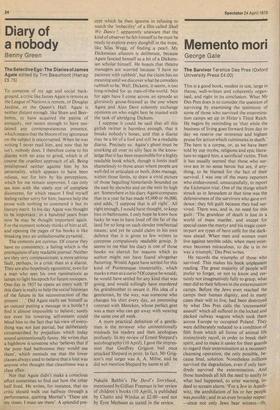Diary of a nobody
Benny Green
The Selective Ego:The Diaries of James Agate edited by Tim Beaumont (Harrap £5.75)
To someone of my age and social background, a critic like James Agate is remote as the League of Nations is remote, or Douglas Jardine, or the Queen's Hall. Agate is neither distant enough, like Shaw and Beerbohm, to have acquired the patina of antiquity, nor recent enough to have sustained any contemporaneous presence, which means that the bloom of my ignorance on the subject is uncorrupted. When he was writing I never read him, and now that he isn't, nobody does. I therefore come to his diaries with no axes to grind, which is of course the cruellest approach of all. Being predisposed neither against him by his personality, which appears to have been odious, nor for him by his perceptions, which for me remain unproven. I can only see him with the steely eye of complete disinterest, for which reason I find myself feeling rather sorry for him; heaven help the prose with nothing to commend it but its literary merit. In his day Agate was thought to be important; in a hundred years from now he may be thought important again. For the moment nobody thinks of him at all, and opening the pages of his books is like breaking into an unfashionable pyramid.
The contents are curious. Of course they have no consistency, a failing which is the prerequisite of any readable journal. Neither are they very compassionate, a more serious fault, perhaps, in a critic than in a diarist. They are also hopelessly egocentric, even for a man who sees his own ruminations as lamps to light his epoch for future snoopers. ' One day in 1937 he opens an entry with 'If this diary is really to help the social historian of the future in his reconstruction of the present .. .' Did Agate really see himself as an outcast putting a message in a bottle? I find it almost impossible to believe; surely not even his towering self-esteem could blind him to the fact that his view of everything was not just partial, but deliberately circumscribed by prejudices which today sound unintentionally funny. He writes that a highbrow is someone who 'believes that if the poor had bathrooms they would use them', which reminds me that the lower classes always used to believe that a lout was anyone who thought that cleanliness was a class .1ffair.
Not that Agate didn't make a conscious effort sometimes to find out how the other half lived. He writes, for instance, that no critic should walk out halfway through a performance, quoting Martial's 'These are my times. I must see them'. A splendid pre
cept which he then ignores in refusing to watch the `imbecility' of a film called Shall We Dance?, apparently unaware that the kind of observer he felt himself to be must be ready to explore every dunghill in the hope, like Silas Wegg, of finding a pearl. My Dickensian allusion is deliberate, because Agate fancied himself as a bit of a Dickensian scholar himself. He boasts that theatre managers are worried because 'I have no patience with rubbish', but the claim has no meaning until we discover what he considers rubbish to be. Well, Dickens, it seems, is too long-winded for us men-of-the-world. Not for ages have I come across an episode so gloriously goose-brained as the one where Agate and Alan Dent solemnly exchange opinions on who might best be trusted with the task of abridging Dickens.
I suppose it could be said that all this girlish twitter is harmless enough, that it breaks nobody's bones, and that a diarist may be a bit of a fool and still be a readable diarist. Precisely so. Agate's ghost must be smirking all over its silly face in the knowledge that it has been responsible for a highly readable book which, though it limits itself shamelessly to those areas where people are well-fed or articulate or both, does manage, within those limits, to draw a vivid picture of those beguiling hinterlands bounded on the east by showbiz and on the west by high art. Somewhere in his diary Agate computes that in a year he has made 85,000 or S6,000, and adds, 'I suppose that is all right'. All right enough, I would have thought, to keep him in bathrooms. I only hope he knew how lucky he was to have lived off the fat of the land for so long on such slender intellectual means; and yet he could claim in his own defence that it is given to few writers to compose compulsively readable gossip. It seems to me that his diary is one of those books we. cherish for reasons which its author might not have found altogether flattering. Would Agate have settled for this kind of Pooteresque immortality, which marks a man as a curio ? Of course he would ; he would have settled for any kind that was going, and would willingly have murdered his grandmother to secure it. His idea of a gentleman, by the way, was someone who changes his shirt every day, an interesting contrast with Mencken, whose perfect gent was a man who can get away with wearing the same one all week.
A more practical definition of a gentleman is the reviewer who unintentionally misleads his readers and then apologises profusely. In my review of Ernest Shepard's autobiography (10 April), I gave the impression that Geoffrey Grigson had once attacked Shepard in print. In fact, Mr Grigson's real target was A. A. Milne, and he did not mention Shepard by name at all.
Natalie Babbit's The Devil's Storybook, mentioned by Gillian Freeman in her review of children's books (10 April), is published by Chatto and Windus at £2.00—and not by Eyre Methuen as stated in the review.


































 Previous page
Previous page